人教版新目标七年级下册英语unit4到unit6知识点总结和单元检测
人教版英语七年级下册Unit 4 --unit6 知识水平过关检测含答案

Unit 4一、根据句意及首字母或汉语提示填空。
(每小题1分;共10分)1.Sandy _______(练习) the piano in the evening .2.The kids are talking l oudly in the classroom . They’re very _______ (吵闹的)3.There are many _____ (规则)in my home .4.We have to _______(穿) sports shoes for the PE class .5.How do you _______ (感觉) ? You l ook terrible .6.I’m s________ that I can’t help you .7.Jack wants to r________ books in the evening .8.Don’t stay o_________ the house . It’s so hot9.We often have speech contests (比赛) in our school h_______ .10.--Do you have to wear u______ today ?--Yes, because it’s Uniform Day today .二、用括号内所给词的适当形式填空。
(每小题1分,共10分)1.“Please be quiet . Don’t ______ (talk) !” says our biology teacher .2.Please remember _______ (do) your homework after school .3.Can you help me ______ (make ) dumplings ?4.You must _____ (be ) on time next time .5.The boss (老板) always keeps these workers _______ (work ) over 10 hoursa day .6.The dog is _____ (noise ) . Keep it out .7.He needs _____ (relax ) after he does his homework .8.I want to learn ______ (make ) breakfast9.Mary always does her homework ________ (one) when she gets home .10.My brother has to practice _________ (play) the guitar every evening .三、单项选择(每小题2分,共20分)( ) 1. ______ sleep late.A Don’tB No, he can’t C. No D. Not ( ) 2. --Can Bob sing the song in English .--_______ .A Yes, I can B. No, he can’t C. Yes, he is D. Yes, he can’t( ) 3. I love music so I often ______ music at home .A hear B. listen to C. listen D. hear to( ) 4. Peter must do his homework ________ school nights .A in B. on C. at D. for( ) 5. I often go to bed late because I have ____ homework to do every day .A too many B. too much C many too D. much too( ) 6. Don’t run in the classroom ______ the hallways .A and B. or C. yet D. but( ) 7. Sorry , you ______ play soccer in the classroom .A can’t B. don’t C. don’t have to D. aren’t( ) 8. My parents love me but they’re also very strict ______ me .A with B. in C. for D. to( ) 9. The room is too _____ . Let’s clean it .A new B. old C. dirty D. big( ) 10. Do you know her ? I remember ______ you about her .A to tellB to telling C. telling D. tell四、按要求完成下列句子,每空一词。
人教版英语七年级下册 Unit 4 ---6考点梳理复习
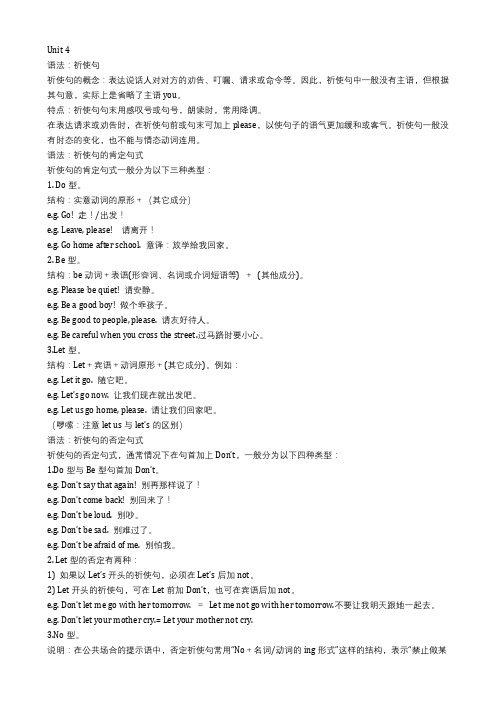
语法:祈使句祈使句的概念:表达说话人对对方的劝告、叮嘱、请求或命令等。
因此,祈使句中一般没有主语,但根据其句意,实际上是省略了主语you。
特点:祈使句句末用感叹号或句号,朗读时,常用降调。
在表达请求或劝告时,在祈使句前或句末可加上please,以使句子的语气更加缓和或客气。
祈使句一般没有时态的变化,也不能与情态动词连用。
语法:祈使句的肯定句式祈使句的肯定句式一般分为以下三种类型:1. Do型。
结构:实意动词的原形+(其它成分)e.g. Go! 走!/出发!e.g. Leave, please! 请离开!e.g. Go home after school. 意译:放学给我回家。
2. Be型。
结构:be动词+表语(形容词、名词或介词短语等) +(其他成分)。
e.g. Please be quiet! 请安静。
e.g. Be a good boy! 做个乖孩子。
e.g. Be good to people, please. 请友好待人。
e.g. Be careful when you cross the street.过马路时要小心。
3.Let型。
结构:Let+宾语+动词原形+(其它成分)。
例如:e.g. Let it go. 随它吧。
e.g. Let’s go now. 让我们现在就出发吧。
e.g. Let us go home, please. 请让我们回家吧。
(啰嗦:注意let us与let’s的区别)语法:祈使句的否定句式祈使句的否定句式,通常情况下在句首加上Don’t,一般分为以下四种类型:1.Do型与Be型句首加Don’t。
e.g. Don’t say that again! 别再那样说了!e.g. Don’t come back! 别回来了!e.g. Don’t be loud. 别吵。
e.g. Don’t be sad. 别难过了。
e.g. Don’t be afraid of me. 别怕我。
新目标七年级下册英语期末复习提纲unit 4-unit6(重点单词 短语 句型 语法)

Unit 4 Don’t eat in class一、重点单词arrive 到达listen 听important 重要的quiet 安静的practice 练习dirty 脏的noisy 吵闹的terrible 可怕的strict 严格的remember 记得relax 放松keep 保持二、重点短语have to 必须、不得不on time 准时make one’s bed 铺床be strict with sb. 对某人严格要求help sb. do sth. 帮助某人做某事follow the rules 遵守规则do the dishes 清洗餐具三、重点句型1.Don’t arrive late for class. We must be on time.2.No talking! / No photos! (No 后跟动名词或名词表示禁止做某事)3.What do you have to do?I have to be quiet in the library。
四、语法知识1.肯定的祈使句:(1) 实义动词原形+其他;(2) be动词原形+形容词+其他;(3) Let sb do sth.否定的祈使句:(1) Don’t+实义动词+原形;(2) Don’t be+形容词+其他;(3) Don’t let sb do sth (4) No+Ving.练:(1) My mother said to me, “Tom, _______ in bed.”A. not readB. doesn’t readC. don’t readD. didn’t read(2) Don’t __________ (fight). = No __________ (fight).2. 不要迟到:(arrive = be)上课/上学不要迟到:3.4. 在学校我们必须穿校服:复数:练:(1) –I can’t stop smoking, doctor. –For your health, I’m afraid you ______.A. canB. mayC. mustD. have to5.too many+可数名词复数too much+不可数名词6. 我从来没有任何快乐:(never译为“从来没有”,表示否定,否定句中表示“任何,一些”,用any)7. 不要大声说话:请大声说:9. 表示“地点”的词组:(1) the classroom class the hallways10. 表示“时间”的词组:(1) 下课后:after class 放学后:after school(2) 在上学的白天/(3) 到晚上1010 o’clock p.m.11. (1) with 和;如:(不能用and)(2) with 戴着;如:(不能用wears)(3) with 有着;如:(不能用has)12. practice doing sth. 练习做某事13. remember to do sth 记得去做某事remember doing sth. 记得做过某事14. 以must 开头的一般疑问句,否定回答用needn’t 或don’t have to 来回答。
人教新目标英语七年级下册知识点总结unit4-unit6
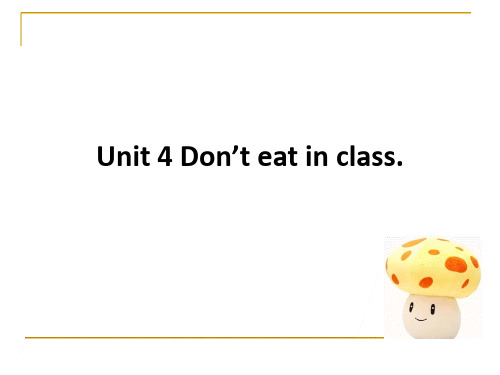
Unit 4 Don’t eat in class.
人教新目标英语七年级下册知识点总 结unit4-unit6( 共16张 PPT)
• 1,祈使句(变否定在句首+don’t) • (1)Be型(be +表语), • 否定形式:don’t + be +表语 • Be quiet,please. • Don’t be late! • (2)Do型(实义动词+其他), • 否定形式:don’t +实义动词+其他 • Come here,please.
• have a good/ great/ wonderful time+V-ing
• 1.回答why的提问要用because • 2,Kind of 相当于副词,修饰形容词或副词,
意为“稍微,有点”,与a little/ bit 相近 • A kind of 意为“一种”, • some kinds of 意为“几种”, • all kinds of 意为“各种各样的”。 • 这里的kind 是“种,类,属”的意思。
picking of flowers
• 2,in class在课堂上 in the classroom 在教 室
• 3,be on time准时 • 4,listen to music听音乐 • 5,(have a)fight with sb与某人打架 • 6.eat outside到外边吃饭
• 7.Must 与have to (1)must 表示说话人主观上的看法,意为“必须”。 • have to 表示客观的需要或责任,意为“不得不,必
须”,后接动词原词。
人教版七年级下Unit 4 ---6同步考点复习
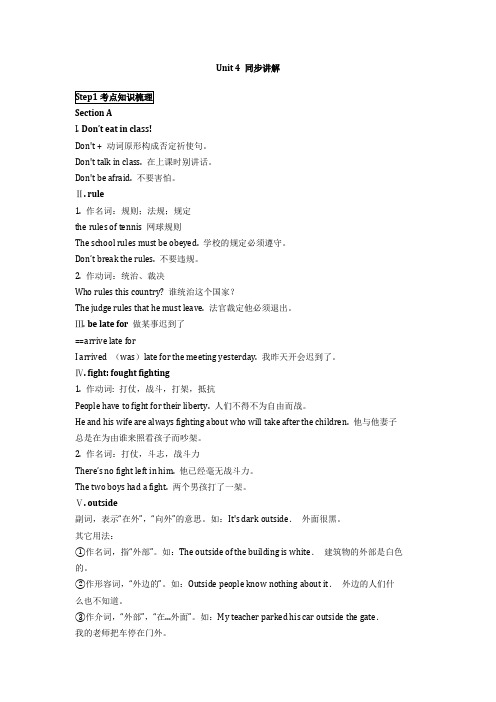
Unit 4 同步讲解Section AI. Don’t eat in class!Don't + 动词原形构成否定祈使句。
Don't talk in class. 在上课时别讲话。
Don't be afraid. 不要害怕。
Ⅱ. rule1. 作名词:规则;法规;规定the rules of tennis 网球规则The school rules must be obeyed. 学校的规定必须遵守。
Don’t break the rules. 不要违规。
2. 作动词:统治、裁决Who rules this country? 谁统治这个国家?The judge rules that he must leave. 法官裁定他必须退出。
Ⅲ. be late for 做某事迟到了==arrive late forI arrived (was)late for the meeting yesterday. 我昨天开会迟到了。
Ⅳ. fight: fought fighting1. 作动词: 打仗,战斗,打架,抵抗People have to fight for their liberty. 人们不得不为自由而战。
He and his wife are always fighting about who will take after the children. 他与他妻子总是在为由谁来照看孩子而吵架。
2. 作名词:打仗,斗志,战斗力There’s no fight left in him. 他已经毫无战斗力。
The two boys had a fight. 两个男孩打了一架。
Ⅴ. outside副词,表示“在外”,“向外”的意思。
如:It's dark outside.外面很黑。
其它用法:①作名词,指“外部”。
如:The outside of the building is white.建筑物的外部是白色的。
新目标英语七年级下册unit 4-6知识点总结

Unit 4 Don’t eat in class.一、词组1、重点单词rule 规则important 重要的outside外面dining hall 餐厅noisy吵闹的before在…前2、短语:◆in class 在课堂上in the classroom 在班里◆arrive late for class= be late for class上课迟到◆be on time◆in the hallways 在走廊里,在过道◆Listen to music:◆Don’t +动词原形. 不要……Don’t run 不要跑Don’t fight. 不要打架◆fight with sb. 和某人打架◆wear a hat◆my first day at school在学校的第一天◆music player 音乐播放器◆be/keep quiet 保持安静◆wear the school uniform 穿校服◆ some of 一些◆I see. 我知道,我了解◆ go out外出(娱乐)◆do the dishes:◆make one’s bed: 铺床◆ practice the guitar 练习吉他◆ do the dishes清洗餐具◆too many rules 规章制度◆ follow the rules 规章制度◆ after school 放学后◆ good luck:祝你好运2、其他短语◆ make rules 制定规章制度◆ break the rules 违反规章制度◆make dinner/breakfast做饭/早饭◆ on school nights 学校住宿的夜间◆take…for a walk 带领…散步二、用法集萃★You can’t …和Don’t …的转化You can’t be late.= D on’t be late.◆ arrive in/at 到达(后接地点)◆ practice(doing)sth. 练习(做)某事◆bring…to…把……带来……如:Her mother is very strict_________her.★I know how you feel.我知道你感受如何。
七年级英语下 Units4-6知识点归纳

七年级(下)上半期Units 4-6知识点归纳Unit 4 I want to be an actor.1. I want to be an actor. 我想成为一名演员。
“want to be + 职业”表示“想成为一名……”如:I want to be a doctor. 我想成为一名医生。
He wants to be a teacher. 他想成为一名教师。
★want用法:1)want sth I want a basketball.2)want to do sth I want to play basketball .3)want sb to do sth. I want you to play basketball with me .2. actor 男演员。
actress 女演员。
☆一位演员要用an而不用a。
如:He’s an actor. 他是一位演员。
类似:waiter 男侍者。
waitress 女侍者3. report + er = reporter 记者。
“动词+ er = 发出动作的人”。
这是一种构词法。
如:teach 教书teacher教师run— runner write—writer作家work— worker 工人★有少数两个是加or。
如:actor visitor参观者4. policeman男警察。
☆其复数为policemenman 复数为men;woman 复数为women policewoman 复数为policewomen如:There are two policemen on the street. 街上有两位警察。
5.in hospital 住院in the /a hospital 在医院。
如:He is ill in hospital. 他生病住院了。
His father works in a hospital. 他父亲在一家医院工作。
6. What does he do? 他是做什么的?what对“职业”提问。
人教版七年级下Unit 4 ---6知识点汇总

知识点归纳总结unit 4 Don’t eat in class.Section A1. arrive late for 迟到,侧重到达的时间晚be late for 迟到侧重于状态arrive late for class/school. = be late for class/school. 上课/上学迟到2.on time准时按规定时间或指定时间做某事不早不晚in time及时不迟到或在规定时间之前或接近所规定时间做某事没有迟到,时间还充裕He always go to school on time.他总是按时上学。
Fireman reached the house on fire in time.消防员及时赶到那幢失火的房子。
3.祈使句表示请求,命令或建议祈使句无主语,主语you常省去,动词原形谓语当,句首加don’t否定变朗读应当用降调,句末常标感叹号。
肯定的祈使句(1)实义动词原形+其他Have a seat here. 请这边坐。
(2)be动词原形+形容词+其他Be a good boy!(3)Let sb d o sth. Let me help you. 让我来帮你。
(4)有的祈使句在意思明确的情况下,动词可省略。
This way, please. = Go this way, please. 请这边走否定的祈使句(1)Don’t+实义动词+原形Don’t forget me!不要忘记我!(2) Don’t be+形容词+其他Don’t be late for school!上学不要迟到!(3) Don’t let sb d o sth Let +宾语+ not + 动词原形+其它成分Don’t let him go. / Let him not go.别让他走。
(4) No+Ving. No smoking! 禁止吸烟! No fishing! 禁止钓鱼4. hear listen sound 听hear听说侧重于听的内容I'm sorry to hear that you are ill. 听说你生病了我很难过。
人教版七年级下Unit 4 ---6期中复习知识点汇总。
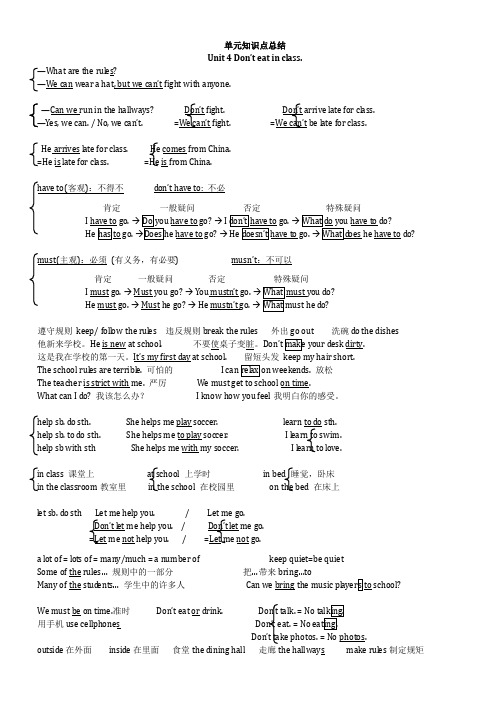
单元知识点总结Unit 4 Don’t eat in class.—What are the rules?—We can wear a hat, but we can’t fight with anyone.—Can we run in the hallways?—Yes, we can. / No, we can’t.He arrives late for class. He comes from China.=He is late for class. =He is from China.don’t have to: 不必一般疑问否定特殊疑问Do you have to go? →Does he have to go?(有义务,有必要) musn’t:不可以一般疑问否定特殊疑问→ Must you go? → You mustn’t go. o?He must go. → Must he go? → He mustn’t go. o?遵守规则keep/ foll ow the rules 违反规则break the rules 外出go out 洗碗d o the dishes他新来学校。
He is new at school. 不要使桌子变脏。
Don’t make your desk dirty.这是我在学校的第一天。
It’s my first day at school. 留短头发keep my hair short.The school rul es are terribl e. 可怕的放松The teacher is strict with me. 严厉We must get to school on time.What can I do? 我该怎么办?I know how you feel我明白你的感受。
help sb. d o sth. She helps me play soccer.help sb. to do sth. She helps me to play soccer.help sb with sth She helps me with my soccer. ove.in class 课堂上at school 上学时in bed 睡觉,卧床in the classroom教室里in the school 在校园里on the bed 在床上let sb. do sth ///a lot of = lots of = many/much = a number of keep quiet=be quietSome of the rul es…规则中的一部分把…带来bring…toMany of the stud ents…学生中的许多人Can we bring the music players to school?We must be on time.准时Don’t eat or drink. Don’t talk. = No talking.用手机use cellphones Don’t eat. = No eating.Don’t take photos. = No photos.outsid e在外面inside在里面食堂the dining hall 走廊the hallways make rules制定规矩wear a hat What else? 还有其他什么?Dr. = Doctor教授,医生,博士important重要的wear a hat~ wear hats吵闹He makes noise. / He is noisy. Know about: 了解有关…的事情达到:arrive/ get to 小地方大地方练习practice + n She practices the piano.practice + doing She practices swimming.listen 听(动作) Listen to the teacher in class.听课There are a l ot of things you can d o.hear听到(结果)Can you hear me? There are a lot of songs you can sing.before going to bed after having dinner He likes apples, I like apples, too.=before I go to bed =after I have dinner He doesn’t like apples, I don’t like apples, either.remember to d o记得要去做I remember to give you the money.我记得要给你钱。
人教版英语七年级下册 Unit 4 ---6重难点复习
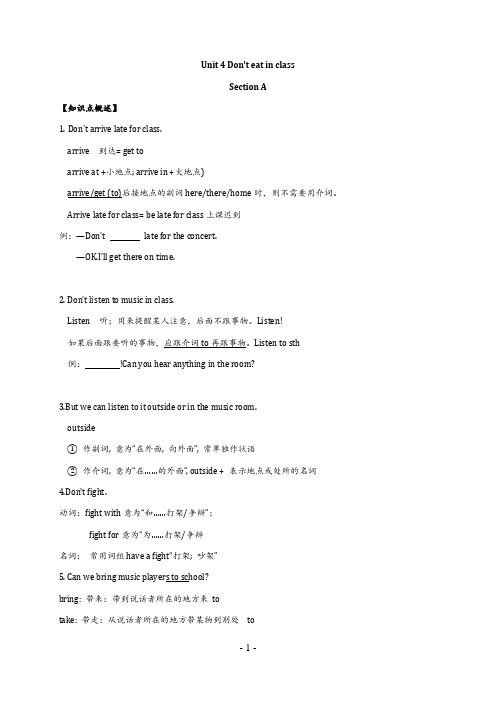
Unit 4 Don't eat in classSection A【知识点概述】1.Don’t arrive late for class.arrive 到达= get toarrive at +小地点; arrive in +大地点)arrive/get (to)后接地点的副词here/there/home时,则不需要用介词。
Arrive late for class= be late for class上课迟到例:—Don’t late for the concert.—OK.I’ll get there on time.2. Don’t listen to music in class.Listen 听;用来提醒某人注意,后面不跟事物。
Listen!如果后面跟要听的事物,应跟介词to再跟事物。
Listen to sth例:!Can you hear anything in the room?3.But we can listen to it outside or in the music room.outside① 作副词, 意为“在外面, 向外面”, 常单独作状语② 作介词, 意为“在……的外面”, outside + 表示地点或处所的名词4.Don't fight.动词:fight with意为“和……打架/争辩”;fight for意为“为……打架/争辩名词:常用词组have a fight“打架; 吵架”5. Can we bring music players to school?bring: 带来:带到说话者所在的地方来totake: 带走:从说话者所在的地方带某物到别处to6. can / must /have to+动词原形can许可,可以,否can’t表,不可以。
must主观,必须,否mustn’t,不准,禁止have to客观,必须,一般可与must互换,三单has to,一般现在时的否定为don’t / doesn’t have to,“不必”。
最新人教版七年级英语下册4--6单元知识点总结
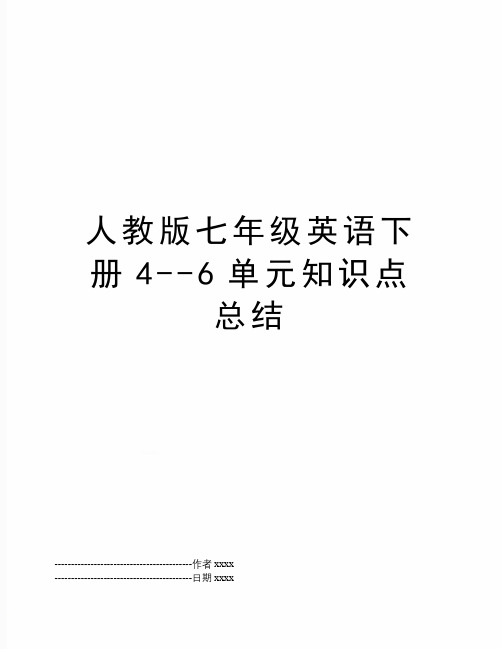
人教版七年级英语下册4--6单元知识点总结------------------------------------------作者xxxx------------------------------------------日期xxxx第四单元Don’t eat in class重点短语1。
on time 准时,按时2. listen to …听……3. inclass在课上4。
be late for 做……迟到5. have to 不得不6。
be quiet 安静7.go out 外出8. dothe dishes清洗餐具9。
make breakfast做早饭10。
make (one’s) bed 铺床11.be noisy 吵闹12. keep one’s hair short 留短发13。
play with sb. 和某人一起玩14.play the piano 弹钢琴15. have fun 玩得高兴16。
make rules制订规则重点语法1、祈使句肯定的祈使句:(1) 实义动词原形+其他;(2) be动词原形+形容词+其他;(3) Let sb do sth.否定的祈使句:(1) Don’t+实义动词+原形;(2) Don’t be+形容词+其他;(3) Don’t let sb do sth(4) No+Ving.2. 不要迟到:Don’tarrive late. = Don’t be late. (arrive= be)上课/上学不要迟到:Don’t arrive (be) latefor class/school.3。
主语省略(无主语):Don’tarrivelate forcl ass。
主语不省略(有主语):We can’t arrive ;ate for class。
4。
在学校我们必须穿校服:We haveto wear uniforms at school。
句型:不得不/必须做某事:have to do sth否定:不必做某事:don’t haveto dosth穿校服:单数:wear a uniform 复数:wear uniforms 5. 在我家里有太多的规矩:I have too many rules in my h ouse。
人教版初中英语七年级下册中考总复习:Units4-6七年级下册教材考点梳理整合+单元练习(含答案)
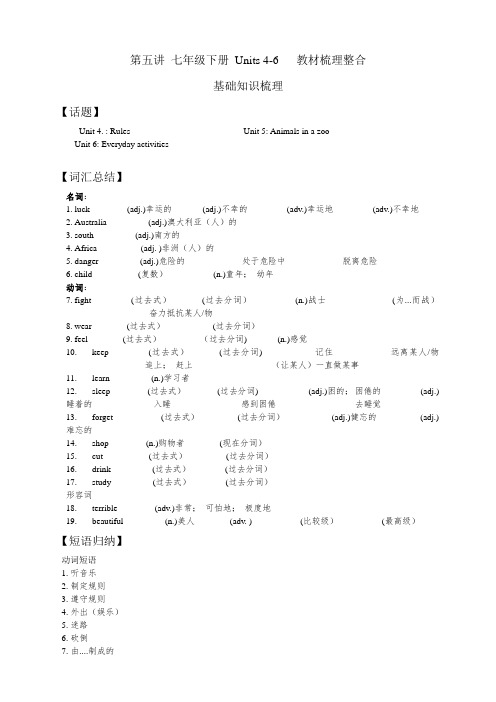
第五讲七年级下册Units 4-6 教材梳理整合基础知识梳理【话题】Unit 4. : Rules Unit 5: Animals in a zooUnit 6: Everyday activities【词汇总结】名词:1.luck ________(adj.)幸运的_______(adj.)不幸的_________(adv.)幸运地_________(adv.)不幸地2.Australia _________(adj.)澳大利亚(人)的3.south _________(adj.)南方的4.Africa _________ (adj. )非洲(人)的5.danger _________(adj.)危险的____________ 处于危险中_____________脱离危险6.child __________(复数)__________ (n.)童年;幼年动词:7.fight________ (过去式)_______(过去分词)__________(n.)战士_______________(为...而战)_________________ 奋力抵抗某人/物8.wear________(过去式)___________(过去分词)9.feel________(过去式)_________(过去分词)_______(n.)感觉10.keep ________(过去式)_______(过去分词)____________记住_____________远离某人/物_________________ 追上;赶上__________________(让某人)一直做某事11.learn _________(n.)学习者12.sleep ________(过去式)________(过去分词)___________ (adj.)困的;困倦的_________(adj.)睡着的______________入睡________________感到困倦__________________去睡觉13.forget __________ (过去式)_________(过去分词)___________(adj.)健忘的__________(adj.)难忘的14.shop ________(n.)购物者________(现在分词)15.cut __________(过去式)_________(过去分词)16.drink _________(过去式)________(过去分词)17.study _________(过去式)________(过去分词)形容词18.terrible ________(adv.)非常;可怕地;极度地19.beautiful _________(n.)美人________(adv. )___________(比较级)__________(最高级)【短语归纳】动词短语1.听音乐__________________2.制定规则__________________3.遵守规则___________________4.外出(娱乐)__________________5.迷路_________________________6.砍倒________________________7.由....制成的____________________8.看报纸____________________9.去电影院____________________10.出去吃饭____________________11.喝茶_______________________12.做汤______________________介词短语13.按时_______________________14.放学后____________________15.及时_____________________16.在食堂____________________17.处于(极大)危险之中______________________形容词短语18.(对某人)要求严格_____________19.害怕....______________________名词短语20.赛龙舟__________________21.端午节_____________________22.南非____________________【句子提炼】规则意识1.我们上课不能迟到。
七年级英语下册Unit 4-Unit 6单元知识点汇总
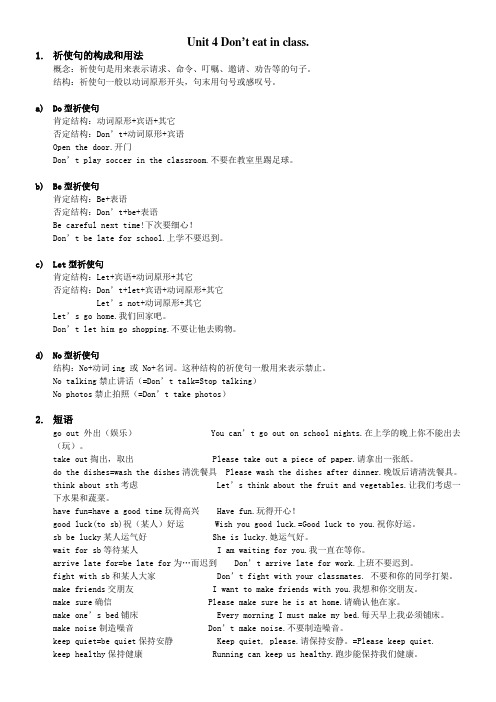
Unit 4 Don’t eat in class.1.祈使句的构成和用法概念:祈使句是用来表示请求、命令、叮嘱、邀请、劝告等的句子。
结构:祈使句一般以动词原形开头,句末用句号或感叹号。
a)Do型祈使句肯定结构:动词原形+宾语+其它否定结构:Don’t+动词原形+宾语Open the door.开门Don’t play soccer in the classroom.不要在教室里踢足球。
b)Be型祈使句肯定结构:Be+表语否定结构:Don’t+be+表语Be careful next time!下次要细心!Don’t be late for school.上学不要迟到。
c)Let型祈使句肯定结构:Let+宾语+动词原形+其它否定结构:Don’t+let+宾语+动词原形+其它Let’s not+动词原形+其它Let’s go home.我们回家吧。
Don’t let him go shopping.不要让他去购物。
d)No型祈使句结构:No+动词ing 或 No+名词。
这种结构的祈使句一般用来表示禁止。
No talking禁止讲话(=Don’t talk=Stop talking)No photos禁止拍照(=Don’t take photos)2.短语go out外出(娱乐) You can’t go out on school nights.在上学的晚上你不能出去(玩)。
take out掏出,取出 Please take out a piece of paper.请拿出一张纸。
do the dishes=wash the dishes清洗餐具 Please wash the dishes after dinner.晚饭后请清洗餐具。
think about sth考虑 Let’s think about the fruit and vegetables.让我们考虑一下水果和蔬菜。
have fun=have a good time玩得高兴 Have fun.玩得开心!good luck(to sb)祝(某人)好运 Wish you good luck.=Good luck to you.祝你好运。
人教版七年级下Unit 4 ---6同步考点汇总
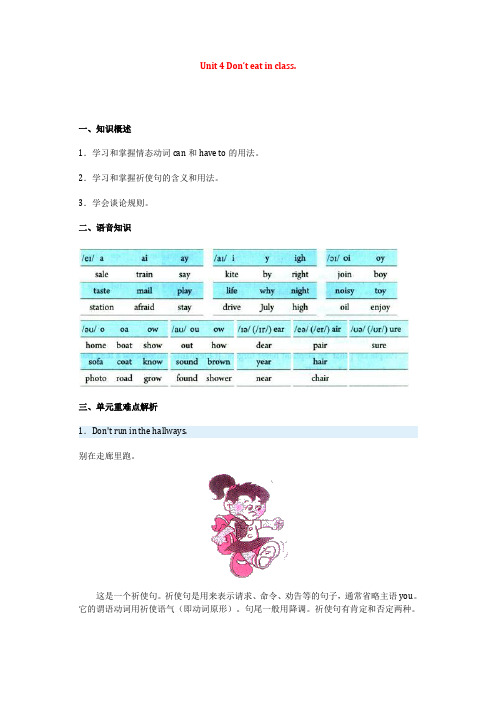
Unit 4 Don’t eat in class.一、知识概述1.学习和掌握情态动词can和have to的用法。
2.学习和掌握祈使句的含义和用法。
3.学会谈论规则。
二、语音知识三、单元重难点解析1.Don't run in the hallways.别在走廊里跑。
这是一个祈使句。
祈使句是用来表示请求、命令、劝告等的句子,通常省略主语you。
它的谓语动词用祈使语气(即动词原形)。
句尾一般用降调。
祈使句有肯定和否定两种。
e in, please! 请进!Sit down, please. 请坐。
Let's go home. 我们回家吧。
否定的祈使句是在动词前(即句首)加Don’t。
e.g.Don’t talk in class!不要在课常上讲话!Don’t open the window!别开窗!Don’t be late for school.上学别迟到。
Don’t listen to music in class.课堂上不要听音乐。
2.Don’t arrive late for class. You must be on time.[译文]上学不要迟到。
你必须准时到校。
(1)arrive是不及物动词,不能直接跟表示地点的名词。
如果要跟名词,就必须加介词in或at。
at后接小地点,in后接大地点。
e.g.We will arrive at the village at 5 tomorrow afternoon.我们将明天下午5点到达这个村子。
How will you arrive in Shanghai?你们将如何到达上海?注意:如果arrive后不接名词,就不用介词:e.g.After you arrive (here/there), please call me.你到了(这里/那儿)后给我打个电话。
(2)late adj. & adv. 迟,晚e.g.Why are you late?你为什么迟到?Sorry, I come late.对不起,我来晚了。
人教版七年级下Unit 4 ---6重难点复习
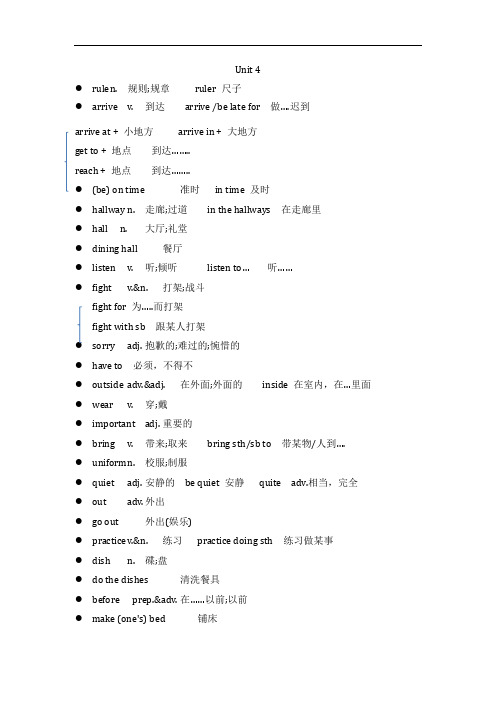
Unit 4●rule n.规则;规章ruler 尺子●arrive v.到达arrive /be late for 做….迟到arrive at + 小地方arrive in + 大地方get to + 地点到达……..reach + 地点到达……..●(be) on time准时in time 及时●hallway n.走廊;过道in the hallways 在走廊里●hall n.大厅;礼堂●dining hall餐厅●listen v.听;倾听listen to…听……●fight v.&n.打架;战斗fight for 为…..而打架fight with sb 跟某人打架●sorry adj.抱歉的;难过的;惋惜的●have to 必须,不得不●outside adv.&adj.在外面;外面的inside 在室内,在…里面●wear v.穿;戴●important adj.重要的●bring v.带来;取来bring sth/sb to 带某物/人到….●uniform n.校服;制服●quiet adj.安静的be quiet 安静quite adv.相当,完全●out adv.外出●go out外出(娱乐)●practice v.&n.练习practice doing sth 练习做某事●dish n.碟;盘●do the dishes清洗餐具●before prep.&adv.在……以前;以前●make (one's) bed铺床●dirty adj.脏的●kitchen n.厨房●more adj.&pron.更多(的)●noisy adj.吵闹的noise n.喧嚣声,噪音●relax v.放松;休息relaxed/relaxing adj. 轻松的(人用ed,物用ing)●read v.读;阅读●terrible adj.非常讨厌的;可怕的●feel v.感受;觉得●strict adj.严格的;严厉的be strict with sb对某人要求严格be strict in sth对某事要求严格●remember v.记住;记起remember to do 记得要做某事remember doing 记得做过某事●follow v.遵循;跟随●follow the rules遵守规则●luck n.幸运;运气good luck!/good luck to you ! 祝你好运!●keep v.保持;保留keep+宾语+ adj 使….保持…状态keep the classroom cleankeep doing 保持做….●hair n.头发;毛发keep one’s hair short 留短发●learn v.学习;学会learn to do 学习做某事●have fun = have a good time 玩的开心have fun doing 做某事很开心祈使句:1)Do 型:Go and wash your hands.2)Be 型:Be quiet, please.3)Let 型:Let me help you.否定形式:1)Do 型、Be 型在句首加Don’tDon’t forget me.Don’t be late for school.2)Don’t let……或let…not….Don’t let him go. = let him not go.3)No 开头No speaking.七年级下Unit5Section AI. Key words1. zoo n.动物园scared adj.吓人的(修饰人)2. panda n.熊猫14. kind n. 种类adj. 和蔼的:宽容的3. tiger n. 老虎15. Australia n.澳大利亚4. elephant n.大象Australian adj.澳大利亚的;n.澳大利亚人5. koala n.树袋熊;考拉16. south n.南:南方adj.南6. lion n.狮子southern adj.南方的7. giraffe n.长颈鹿southerner n.南方人8. animal n.动物north n.北;北方9. cute adj.可爱的west n.西:西方zy adj.懒惰的:懒散的east n.东;东方lazily adv.懒惰地laziness n.懒惰17. African.非洲11. smart adj.聪明的18. pet n.宠物clever adj.聪明的:机灵的19. leg n.腿12.beautiful adj. 美丽的;美好的20. cat n.猫beautifully adv.美好地:漂亮地21. sleep v./n.睡觉beauty n.美丽sleepy adj.欲睡的13. scary adj.吓人的;恐怖的( 修饰物) asleep adj.睡着的II. Phrases1. my favorite animal我最喜欢的动物walk on one's hands用手行走2. my new pet我的新宠物walk on one's knees跪着走3. really scary真的恐怖8. sleep all day整天睡觉4. kind of有点儿;稍微9. 非常喜欢某事(物)kind of interesting有点儿有趣like sth. a lota kind of 一种=like sth. very muchall kinds of各种各样的10. be scared of sth. / doing sth.害怕某5. very cute非常可爱事/做某事be scared to do sth.害怕做某事6. be from South Africa 11. an elephant 一头大象= come from South Africa 产自南非 a white elephant 一头白象7.walk on two legs用两条腿走路III. Sentences1.你为什么喜欢熊猫?因为他们有点儿意思。
- 1、下载文档前请自行甄别文档内容的完整性,平台不提供额外的编辑、内容补充、找答案等附加服务。
- 2、"仅部分预览"的文档,不可在线预览部分如存在完整性等问题,可反馈申请退款(可完整预览的文档不适用该条件!)。
- 3、如文档侵犯您的权益,请联系客服反馈,我们会尽快为您处理(人工客服工作时间:9:00-18:30)。
.
精品文档
and says, " I can find my way. I don't want to walk home, you know."
( ) 56. Mr Brown often comes home at
for his lunch.
A. twelve B. eleven C. twelve thirty D. twelve ten
( ) 59. Mr Brown has lunch
.
A. in the car B. at home C. in the park D. at twelve
( ) 60. Mr Brown is very . A. young(年轻)B. wrong(错误)C. foolish 愚蠢)D. clever
10、practice (doing)sth
11、wash/ do the dishes
12、on school days/ nights
13、break/ follow(obey)the rules
14、Be strict with sb/ oneself
be strict in sth 对……严格。
Mr Brown is a very old man. Every morning he goes for a walk(散步) in the park.
And he comes home at twelve thirty for his lunch. But today a car stops(停) at his house at twelve o'clock.
A. Harry is nine
B. Harry goes to school on foot
C. Harry’s home isn’t far from the school D. Harry makes her angry
( ) 4. The teacher’s dress is dirty because _____.
18、remember/ forget+to do 要做
+doing 做过
29、have fun,enjoy oneself,have a good/ great/ wonderful time+V-ing
单元检测
.
精品文档
一、完形填空:
I’m not happy. I have too __1_ rules in my family. I have to __2___ at 6:00 every morning. I can’t __3__ my friends
精品文档
教学课题
人教版新目标七年级下册 unit4 Don’t eat in class 知识点总结和单 元检测
教学目标 Can talk about rules
教 学 重 点 1、祈使句的掌握
与难点
2、情态动词 can,have to,must 的掌握
知识点总结
1、祈使句(变否定在句首+don’t)
Two policemen help him get out. One of them says to Mr Brown's daughter, "The old man can't find his way in the park.
He asks us to take him home in the car." The daughter thanks the policemen and they leave
15、too ma数名词
much too“实在太”修饰形容词或副词
16、make one’s/ the bed
17、get to, arrive in/at, reach,到达(如果后面接地点的副词 home,here 或 there ,就不用介词 in ,at, to)
after school __4__I have to __5__my dog for a walk. I can’t watch TV on school nights. And I have to __6_ in bed by
ten o’clock. _7__ weekends, I have to clean my room and wash my clothes. Then I have to help my mother __8__ dinner. Later I have to go to the Children’s Palace __9__ the piano. I never have any fun. __10__ can I do? ( )1. A. many B. much C. a few ( )2. A. go to bed B. get up C.go home ( )3. A. watch B. look C. meet ( )4. A. so B. then C. because ( )5. A. bring B. take C. carry ( )6. A. be B. is C. am ( )7. A. In B. On C. At ( )8. A. make B. making C. do ( )9. A. learn B. to learn C. learning ( )10. A. Why B. What C. How 二、阅读理解:
式为 had to. 构成否定句或疑问句时借助动词 do/ does。
(3)have to 的否定式是 needn’t=don’t / doesn’t have to (不必要);must 的否定式是 must not/ mustn’t(一定不能,
不允许)。
8、Some of…
9、bring…to…
A. Nobody
B. Harry C. Many students D. A few students
( ) 2. There’s a ________ on the teacher’s chair.
A. tomato B. book C. pen D. bag ( ) 3. The teacher asks Harry’s mother to school because ________.
(
离
开). Then she asks her father, "Dad, you go to that park every day. But today, you can't find the way. What's wrong with
you? ( 你 怎 么 啦 ? ) " The old man smiles ( 笑 ) like a child ( 像 个 小 孩 )
5、(have a)fight with sb
6、eat outside
7、Must 与 have to
(1)must 表示说话人主观上的看法,意为“必须”。 have to 表示客观的需要或责任,意为“不得不,必须”,
后接动词原词。
(2)must 没有人称,时态和数的变化 Have to 有人称,数,时态的变化,其第三人称单数形式为 has to ,过去
教学课题
人教版新目标七年级下册英语 unit 5 Why do you like pandas?知识点 总结和单元检测
1、Describe animals 教学目标
2、Express preferences
教 学 重 点 (1)特殊疑问句的问题与回答
与难点
(2)本单元的新词汇多及内容跨度大也给学生在理解和掌握上带来了一定的困难。
Be 型(be +表语),否定形式:don’t + be +表语
Be quiet,please. Don’t be late!
Do 型(实义动词+其他),否定形式:don’t +实义动词+其他
Come here,please. Don’t play football here.
Let 型(let sb do sth),否定形式:don’t + let sb do sth 或者 let sb not do sth
No+n/ V-ing No photos /mobile;No parking/ smoking/ spitting/ talking/ picking of flowers
2、in class 在课堂上 in the classroom 在教室
3、be on time 准时
4、listen to music
A. she falls (跌落) to the ground B. it is raining hard(下大雨)
C. she sits on a tomato
D. she puts her cup on the chair
( ) 5. Is Harry very clever ? A. Yes, he is. B. Yes, he isn’t. C. No, he is. D. No, he isn’t.
( ) 57. Today Mr Brown comes home by
.
A. bike B. car C. bus D. boat
( ) 58. The policemen say Mr Brown
in the park.
A. doesn't want to walk home B. find his way C. can't find his way D. knows the way
A
Harry is nine years old. He goes to the school next to his home. He always walks to and back from school. One day he comes back from school late. His mother sees him and asks, “Why are you late, Harry?” “My teacher is very angry(生气的) and asks you to go to her office tomorrow.” “ To her office ? Why?” his mother asks. “Because she asks a question in the class and I am the only person(人) who can answer it.” Says Harry. “You are so clever(聪明的), my son.” His mother says with a smile.(微笑) “Her question is who put (放)the tomato on my chair and make (使)my clothes dirty ?” says Harry. ( ) 1. ______ can answer the teacher’s question in class.
